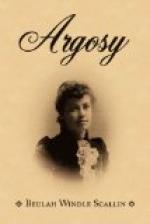that he may have overheard between Captain Chillington
and M. Platzoff. Indeed, had he pretended
to repeat any such conversation, I should have
felt strongly inclined to doubt the truth of his entire
narrative. Happily he disclaims any such
abnormal powers of memory. He can remember
nothing but a chance phrase or two which some secondary
circumstance fixed indelibly on his mind. But
he can remember a great number of little facts
bearing on the relations between his master and
the Russian. These facts, considered singly,
may seem of little or no importance, but taken
in the aggregate, and regarded as so many bits
of mosaic work forming part of a complicated
whole, they assume an aspect of far greater importance.
In any case, they put us on a trail, which may
turn out to be the right one or the wrong one,
but at present certainly seems to be worth following
up. Finally, they all tend to deepen our first
suspicion that M. Platzoff was neither more nor
less than a political refugee. The next
point is to ascertain whether he is still alive.’
“Here again the clear logical intellect of Mirpah (so like my own) came to my assistance. Before parting for the night we were agreed as to what our mode of procedure ought to be on the morrow. This most extraordinary case engages all my thoughts. I am afraid that I shall not be able to sleep much to-night.
“July 10th.—I owe it to Mirpah to say that it was entirely in consequence of a hint from her that I went at an early hour this morning to the office of the Eastbury Courier, there to consult a file of that newspaper. Six months ago the daughter of Sir John Pennythorne was married to a rich London gentleman. Mirpah had read the account of the festivities consequent on that event, and seemed to remember that among other friends of the bridegroom invited down to Finch Hall was some foreign gentleman, who was stated in the newspaper to belong to the Russian Legation in London. Acting on Mirpah’s hint, I went back through the files of the Courier till I lighted on the account of the wedding. True enough, among other guests on that occasion, I found catalogued the name of a certain Monsieur H—— of the Russian Embassy. I had got all I wanted from the Eastbury Courier.
“My next proceeding was to hasten up to Deepley Walls, to obtain an interview with Lady Chillington, and to induce her ladyship to write to Sir John Pennythorne, asking him to write to the aforesaid M. H——, and inquire whether, among the archives (I think that is the correct word) of the Embassy, they had any record of a political refugee by name Paul Platzoff, who, twenty years ago, was in India, etc. I had considerable difficulty in persuading her ladyship to write, but at last the letter was sent. I await the result anxiously. The chances seem to me something like a thousand to one against our inquiry being productive of any tangible result.




